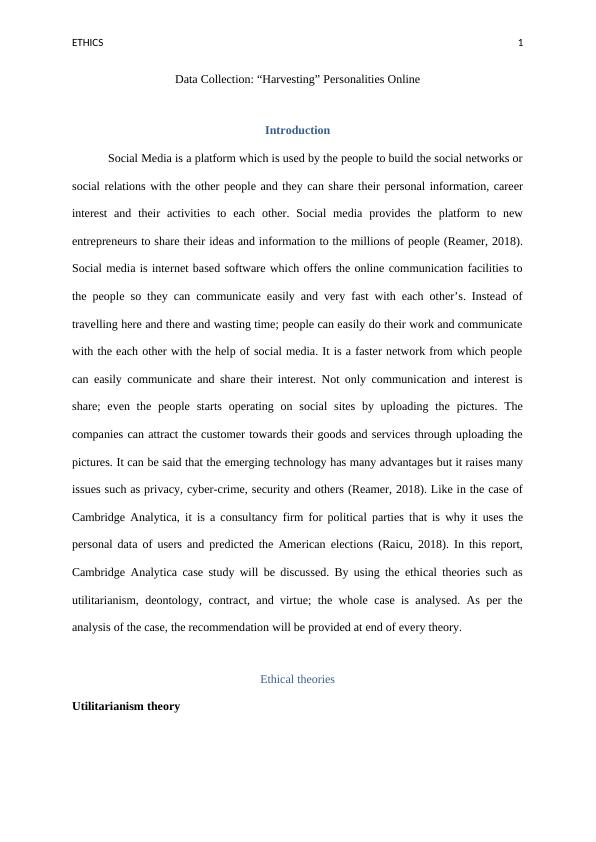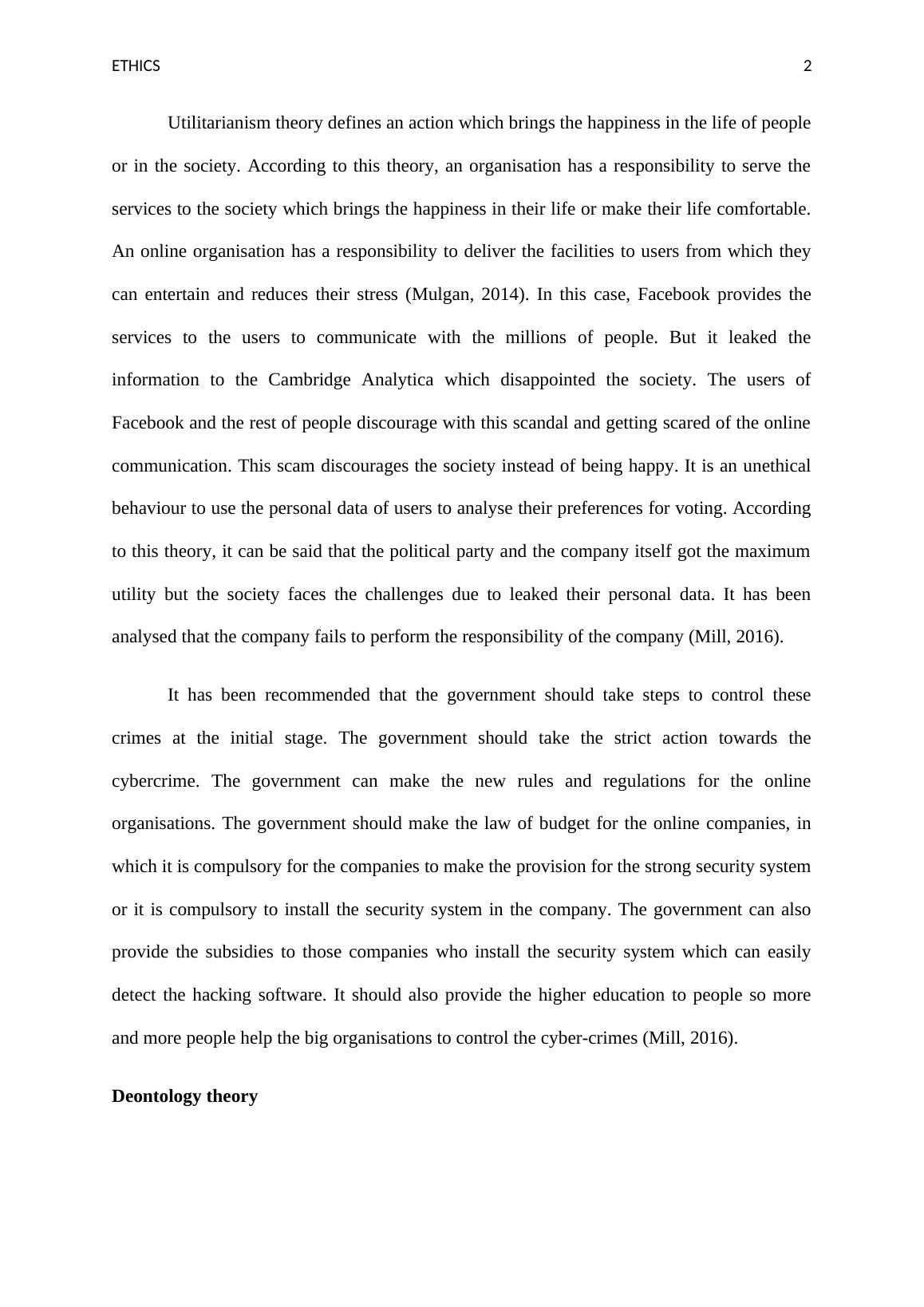Data Collection: “Harvesting” Personalities Online
Added on 2023-06-05
7 Pages1977 Words320 Views
Social Media

ETHICS 1
Data Collection: “Harvesting” Personalities Online
Introduction
Social Media is a platform which is used by the people to build the social networks or
social relations with the other people and they can share their personal information, career
interest and their activities to each other. Social media provides the platform to new
entrepreneurs to share their ideas and information to the millions of people (Reamer, 2018).
Social media is internet based software which offers the online communication facilities to
the people so they can communicate easily and very fast with each other’s. Instead of
travelling here and there and wasting time; people can easily do their work and communicate
with the each other with the help of social media. It is a faster network from which people
can easily communicate and share their interest. Not only communication and interest is
share; even the people starts operating on social sites by uploading the pictures. The
companies can attract the customer towards their goods and services through uploading the
pictures. It can be said that the emerging technology has many advantages but it raises many
issues such as privacy, cyber-crime, security and others (Reamer, 2018). Like in the case of
Cambridge Analytica, it is a consultancy firm for political parties that is why it uses the
personal data of users and predicted the American elections (Raicu, 2018). In this report,
Cambridge Analytica case study will be discussed. By using the ethical theories such as
utilitarianism, deontology, contract, and virtue; the whole case is analysed. As per the
analysis of the case, the recommendation will be provided at end of every theory.
Ethical theories
Utilitarianism theory
Data Collection: “Harvesting” Personalities Online
Introduction
Social Media is a platform which is used by the people to build the social networks or
social relations with the other people and they can share their personal information, career
interest and their activities to each other. Social media provides the platform to new
entrepreneurs to share their ideas and information to the millions of people (Reamer, 2018).
Social media is internet based software which offers the online communication facilities to
the people so they can communicate easily and very fast with each other’s. Instead of
travelling here and there and wasting time; people can easily do their work and communicate
with the each other with the help of social media. It is a faster network from which people
can easily communicate and share their interest. Not only communication and interest is
share; even the people starts operating on social sites by uploading the pictures. The
companies can attract the customer towards their goods and services through uploading the
pictures. It can be said that the emerging technology has many advantages but it raises many
issues such as privacy, cyber-crime, security and others (Reamer, 2018). Like in the case of
Cambridge Analytica, it is a consultancy firm for political parties that is why it uses the
personal data of users and predicted the American elections (Raicu, 2018). In this report,
Cambridge Analytica case study will be discussed. By using the ethical theories such as
utilitarianism, deontology, contract, and virtue; the whole case is analysed. As per the
analysis of the case, the recommendation will be provided at end of every theory.
Ethical theories
Utilitarianism theory

ETHICS 2
Utilitarianism theory defines an action which brings the happiness in the life of people
or in the society. According to this theory, an organisation has a responsibility to serve the
services to the society which brings the happiness in their life or make their life comfortable.
An online organisation has a responsibility to deliver the facilities to users from which they
can entertain and reduces their stress (Mulgan, 2014). In this case, Facebook provides the
services to the users to communicate with the millions of people. But it leaked the
information to the Cambridge Analytica which disappointed the society. The users of
Facebook and the rest of people discourage with this scandal and getting scared of the online
communication. This scam discourages the society instead of being happy. It is an unethical
behaviour to use the personal data of users to analyse their preferences for voting. According
to this theory, it can be said that the political party and the company itself got the maximum
utility but the society faces the challenges due to leaked their personal data. It has been
analysed that the company fails to perform the responsibility of the company (Mill, 2016).
It has been recommended that the government should take steps to control these
crimes at the initial stage. The government should take the strict action towards the
cybercrime. The government can make the new rules and regulations for the online
organisations. The government should make the law of budget for the online companies, in
which it is compulsory for the companies to make the provision for the strong security system
or it is compulsory to install the security system in the company. The government can also
provide the subsidies to those companies who install the security system which can easily
detect the hacking software. It should also provide the higher education to people so more
and more people help the big organisations to control the cyber-crimes (Mill, 2016).
Deontology theory
Utilitarianism theory defines an action which brings the happiness in the life of people
or in the society. According to this theory, an organisation has a responsibility to serve the
services to the society which brings the happiness in their life or make their life comfortable.
An online organisation has a responsibility to deliver the facilities to users from which they
can entertain and reduces their stress (Mulgan, 2014). In this case, Facebook provides the
services to the users to communicate with the millions of people. But it leaked the
information to the Cambridge Analytica which disappointed the society. The users of
Facebook and the rest of people discourage with this scandal and getting scared of the online
communication. This scam discourages the society instead of being happy. It is an unethical
behaviour to use the personal data of users to analyse their preferences for voting. According
to this theory, it can be said that the political party and the company itself got the maximum
utility but the society faces the challenges due to leaked their personal data. It has been
analysed that the company fails to perform the responsibility of the company (Mill, 2016).
It has been recommended that the government should take steps to control these
crimes at the initial stage. The government should take the strict action towards the
cybercrime. The government can make the new rules and regulations for the online
organisations. The government should make the law of budget for the online companies, in
which it is compulsory for the companies to make the provision for the strong security system
or it is compulsory to install the security system in the company. The government can also
provide the subsidies to those companies who install the security system which can easily
detect the hacking software. It should also provide the higher education to people so more
and more people help the big organisations to control the cyber-crimes (Mill, 2016).
Deontology theory

End of preview
Want to access all the pages? Upload your documents or become a member.
Related Documents
Data Collection: “Harvesting” Personalities Onlinelg...
|6
|1785
|320
Data Collection: “Harvesting” Personalities Onlinelg...
|8
|1997
|318
Data Collection: “Harvesting” Personalities Onlinelg...
|7
|1357
|93
Social Media Data Collection: “Harvesting” Personalities Online Ethical Analysislg...
|7
|1743
|15
Data Collection: “Harvesting” Personalities Online - An Ethics Case Studylg...
|5
|1355
|420
Ethical Issues of Cyber Technology: A Case Study of Cambridge Analyticalg...
|7
|1898
|242
